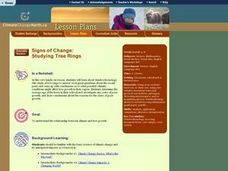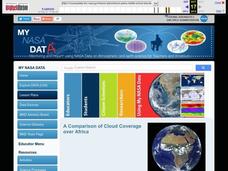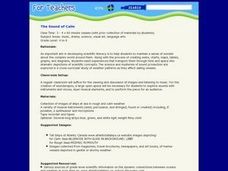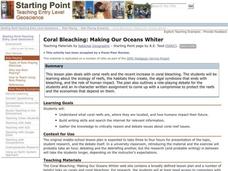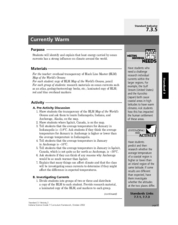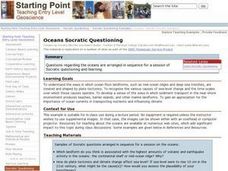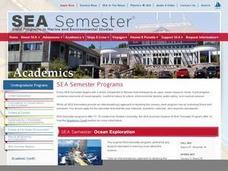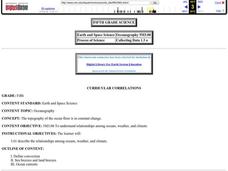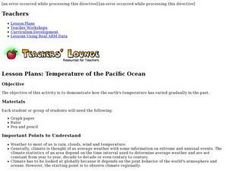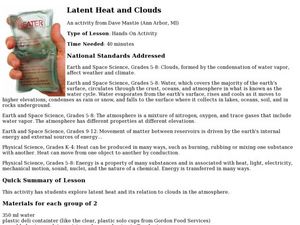Curated OER
Rain Forest Adventures
Students identify and describe where tropical rain forests are located and examine the geographical correlation between rainfall and rain forest. They brainstorm what they think they know about tropical rain forests - where they're...
Curated OER
Ocean Influences on Climate Lesson Plan
Students brainstorm about the geographical factors that contribute to climate. They examine the impact of ocean currents on coastal temperatures.
Curated OER
Signs of Change: Tree Rings
Students identify and experiment with dendrochronology (the study of tree rings to answer ecological questions about the recent past) and come up with conclusions as to what possible climatic conditions might affect tree growth in their...
Curated OER
A Comparison of Cloud Coverage over Africa
Students identify different climate regions and local weather patterns. In this cloud coverage lesson students use NASA satellite data and import it into Excel.
Polar Trec
Sea Ice Impact
The arctic seas contain currents that are both warm (with high salinity) and cold (relatively fresh water) that circulate throughout the year. Through discussion, a lab, and a web quest, participants explore the impacts of melting and...
Devine Educational Consultancy Services
Geography Student Workbook, Australia
Your youngsters will be experts on the geography of Australia after working with these activities and worksheets, which review the continent's weather, major landforms, dimensions, history, and climate.
NASA
Freshwater Availability Classroom Activity
This science assignment produced by NASA teaches inquiring minds the distribution of Earth's water. Learners will appreciate and understand the importance of fresh water and how weather and climate affects everything.
Curated OER
The Sound of Calm
Learners examine the relationships that exist between ocean currents, wind and climate. Using those relationships, they discuss how they affect the oceans. They create their own music to represent the sounds of the ocean and share them...
Curated OER
Where Have All the Glaciers Gone?
Students examine how climate change is affecting sea ice, vegetation and glaciers in the Arctic region.
Curated OER
Geographic Effects on Precipitation, Water Vapor and Temperature
Students investigate the factors affecting climate using Live Access Server. In this geography lesson, students graph atmospheric data using Excel spreadsheet. They compare and contrast temperature, precipitation and water vapor of two...
Curated OER
Coral Bleaching: Making Our Oceans Whiter
Students study coral reefs and the controversy over coral bleaching. They role-play a debate over the issue and come up with a compromise to protect the reefs and the economies that depend on them.
Curated OER
How Temperature Affects Density
Students examine the effects of temperature and density in ocean currents. In this density instructional activity, students explain how coastal climates are impacted by ocean currents. They investigate how the ocean currents are affected...
Curated OER
Currently Warm
Seventh graders investigate how ocean currents affect climate. In this earth science lesson, 7th graders draw and label the current in their assigned ocean. They discuss how currents from the poles differ from the equator.
Curated OER
Oceans Socratic Questioning
Students participate in a whole class discussion of ocean-floor structures and plate tectonics. They respond to prompts in a structured sequence that lead them to conclusions about the role of plate tectonics in the creation of sea-floor...
Curated OER
Temperature Changes: Atmosphere & Ocean
Students observe temperature differences of water and air in sunlight and darkness. They determine that the sun warms the Earth's surface, which controls global currents and climate, keeping the earth habitable. They discover water and...
NOAA
Technology I
Isn't technology great? The 12th installment of a 23-part NOAA Enrichment in Marine sciences and Oceanography (NEMO) program introduces technology that marine scientists use. Pupils take part in an activity using conductivity,...
Curated OER
Sampling the Ocean Floor
Young scholars sample goodies from an unseen ocean floor and try to accurately describe their composition. This simulation helps students explain the limitations of sampling and the problem of obtaining representative samples of sea...
Curated OER
Curricular Correlations
Here is a terrific way to teach your oceanographers about the effects that the ocean have on the weather and climate found throughout the world. In it, pupils engage in a science experiment designed to emulate how the ocean affects...
Curated OER
Temperature of the Pacific Ocean
Young scientists demonstrate how the Earth's temperature has varied gradually in the past. They attempt to answer four questions which all pertain to how the Pacific Ocean's temperature has evolved over time. Internet research, and a...
Curated OER
Latent Heat and Clouds
Students explore latent heat and how it relates to clouds in the atmosphere. In this earth science lesson students investigate how clouds are formed. Students examine clouds and the water cycle.
Curated OER
Rising Air
Students investigate the concept of rising air in the formation of clouds and precipitation. In this rising air lesson, students conduct an experiment with hot and cold water that shows how warm water rises due to thermal buoyancy. They...
Curated OER
CURRENT AND CLIMATE
Students study currents and how they have been used to plot courses for travel. They examine the ocean currents in both the Atlantic and Pacific and discuss their effect on local weather.
Polar Trec
Where is the World's Water?
Scholars discover the amount of the Earth's water in various locations such as the ocean, ice, the atmosphere, etc. They then make a model of the how much water those percentages represent. Finally, analysis questions bring the concepts...
Information is Beautiful
How Many Gigatons of Carbon Dioxide...?
Here is an interesting infographic that presents information on the amount of carbon dioxide we can safely release into the atmosphere compared to the actual amount we have released to date.




